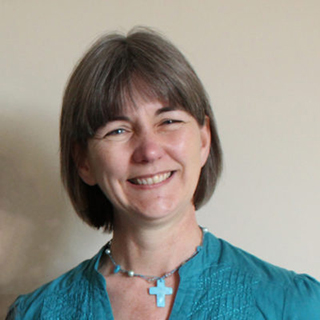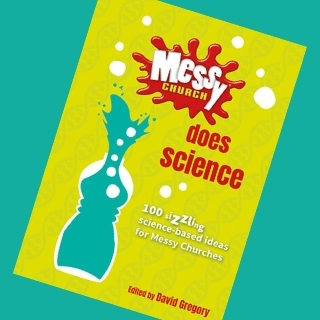Why does the church need to engage with care for the environment? Lucy Moore, founder of Messy Church, explains why this innovative ministry sees it as an opportunity to express its key values of creativity, celebration, Christ-centredness, hospitality and including all ages…
18 July 2021
Going wild
BRF’s Messy Church ministry has just been awarded a significant grant by Scientists in Congregations to fund Messy Adventures – a project that is part of a wider initiative called Messy Church Goes Wild. As well as money, projects like this require a significant amount of time and energy to develop. So why is Lucy so passionate about connecting church – specifically Messy Church – with the natural world?
‘Messy Church Goes Wild is much needed in this season of reimagining how and where we are church,’ says Lucy. ‘It responds to various phenomena: the coronavirus pandemic, which has meant it’s been safer outside than in; the Church of England’s Everyday Faith initiative, which links our discipleship to the world outside church buildings; the ‘rewilding the church’ movement within Fresh Expressions; and the desire for ecological change among young people.’
She adds: ‘It’s long been recognised that children have an affinity for finding and recognising God through the natural world’
So does this represent Messy Church jumping on the ecology bandwagon? Lucy rejects that idea, emphasising how Messy Church Goes Wild connects to all five of the ministry’s key values: creativity, celebration, Christ-centred, hospitality and all-age.
‘Messy Church Goes Wild connects to all five Messy Church values.’
1 Enquiring minds are creative minds
‘It’s an expression of creativity to reimagine and adapt the Messy Church shape to an outdoor context,’ states Lucy.
Scientists who contributed to Messy Church Does Science cited the significance of their childhood experiences in the natural world in their career choice. ‘We want to encourage young people to gain confidence in thinking scientifically, and maybe prompt some to play a positive part in the planet through exploring science careers’.
2 Celebrating the environment
‘Recent research from the University of Exeter Medical School, along with other studies, have shown that being connected to the natural world is hugely beneficial to our well-being,’ says Lucy, pointing also to anecdotal evidence that being in nature has helped people through the pandemic.
Exploring and understanding the natural world is one way to celebrate God’s creation.
‘Understanding the natural world is one way to celebrate God’s creation.’
3 Bringing Christ into the centre
Church, including Messy Church, is about knowing and following Jesus, though. So how does Christian belief play a role in all this?
‘As Christians,’ explains Lucy, ‘we believe that this fullness of life is found ultimately in Jesus Christ; the church has an important part to play in hosting spaces where the connectivity between God’s heart for the world and human beings’ longing for fulfilment can be experienced.
‘Messy Churches meeting in the name of Jesus Christ in the cathedral of the natural world, relating the mysteries of science to the mysteries of faith and finding a language to articulate both – this is an expression of Messy Church Christ-centredness.’
4 A new concept of hospitality
Messy Church Goes Wild – this movement taking shape within Messy Church – ‘is about transforming our behaviour as human beings to make more room for other species on the planet,’ says Lucy.
‘In other words, it’s about expanding our concept of hospitality. As Sir David Attenborough says, “It’s surely our responsibility to do everything within our power to create a planet that provides a home not just for us, but for all life on Earth.”’
5 Bringing the generations together
‘Young people can and do lead the way for whole households to change their behaviour to a more sustainable lifestyle,’ Lucy reminds us.
‘The recent Youthscape and Tearfund report Burning Down the House stresses the concerns of young people in the church regarding the environment: only one in ten think the church is doing enough to respond.
‘Only one in ten young people think the church is doing enough to respond.’
‘Messy Church wants to allow these younger voices’ concerns to be heard, leading and influencing adults. That’s why the Messy Adventures will be devised by teams that include teenagers and older children, for an all-age audience.’
Bringing down barriers
For Lucy, exploring the natural world as part of Messy Church is a chance to correct the idea that faith and science are in opposition.
‘Messy Church has an opportunity to reach a large number of families, especially those with children, who have little or no other direct relationship with the church,’ she suggests.
‘Their experience through Messy Church shapes their view of what the whole church stands for. So a positive dialogue between scientists and faith in a Messy Church context is a witness to the willingness of Christians more generally to engage in science and embrace its approaches and attitudes.’
Impactful and ambitious
I commend Messy Adventures as a creative and impactful response to the grave crises of climate change and biodiversity loss. It will take children and adults outside for hands-on activities, exploration of the natural world and joyful worship which celebrates God the Creator. Not only will it give congregations increased competence in scientific thinking and confidence in taking all ages outside to worship and explore, it will open up our awareness of the interconnectedness of all living things and inspire growth of awe, wonder and joy at God’s creation.”
Graham Usher, bishop of Norwich and lead bishop for the environment for the Church of England
Ambitious in its scope, Messy Adventures will address far-ranging questions of environmental sciences, habitat, biodiversity, sustainable living, properties, materials, processes, life cycles, biology, botany, zoology, geology, anatomy, physiology with elements of physics, chemistry and engineering. This project brings together a number of people working in collaboration with Lucy. Taking the lead on the science side are Dr Dave Gregory, creator of Messy Church Does Science, and BRF authors Martin and Margot Hodson, with support also from Cate Williams, the Gloucester Diocese Environmental Engagement Officer. Also involved are the Messy Church Writers support team and several Messy Churches who will be piloting the material.
Lucy asks that we pray for the writers, scientific consultants and pilot teams as they pioneer with us.

Lucy is BRF’s Messy Church team leader and is the ministry’s founder. She is responsible for developing the work of Messy Church nationally and internationally – writing, speaking, reflecting and developing Messy projects and has written many of the Messy Church books.

Messy Church Does Science
100 sizzling science-based ideas for Messy Churches
In popular culture there is a perceived conflict between science and faith. This resource helps Messy Churches leaders use science to explore aspects of the Christian faith, demonstrate that science and faith are complementary, and enable children and adults alike to appreciate the wonder of creation.

Grounded in hope
‘Stewarding the planet responsibly is costly, but it is a sacrifice we can make for God. If we truly love him, it is a price we are willing to pay.’
Michele D. Morrison
